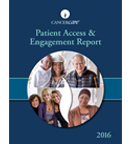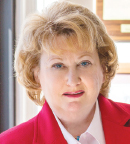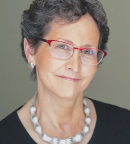
The national nonprofit organization CancerCare has announced the publication of a comprehensive report on experiences, perceptions, and needs of people who are living with and beyond a cancer diagnosis. The 2016 CancerCare Patient Access and Engagement Report is a compilation of results from six distinct surveys with input from more than 3,000 individuals at varying stages of cancer, from newly diagnosed to post-treatment. Those surveyed were selected from a random sampling of individuals with cancer across the United States who were not affiliated with CancerCare.
Patricia J. Goldsmith, CancerCare’s Chief Executive Officer, who joined the organization in 2014, and Ellen Miller Sonet, JD, MBA, Chief Strategy and Alliance Officer of CancerCare, explained the impetus for the study in an interview with The ASCO Post.
“CancerCare has a 73-year history of serving patients, and although we touch nearly 200,000 clients annually, there is much we want to know about how people experience life with and beyond cancer. We needed a better understanding of the specific needs of a broad range of patients throughout their continuum of care,” Ms. Goldsmith said.
“Part of the mission of these surveys was to identify how patients engage, what that actually means, and how we [CancerCare] might help them better engage, since engaged patients often have better outcomes and higher quality of life, with lower health-care costs,” added Ms. Sonet.

Patricia J. Goldsmith

Ellen Miller Sonet, JD, MBA
Diverse Study Population
Ms. Goldsmith further explained, “We set out to reach a broad and diverse group of individuals to mirror the U.S. population with respect to ethnicity, geography, insurance, education, cancer types, and levels of engagement. To accomplish this, we deliberately did not solicit from our own database of patients, but rather, we recruited respondents through online panels that did not collect names from advocacy groups, and we set targets for key demographic criteria. We also convened an exceptional group of advisors to help us hone the audience characteristics, survey topics and questionnaires, as well as assess and interpret the findings.” (See sidebar on page 12 for a list of advisory board members.)
Six-Part Survey
CancerCare worked with the advisory board to create a comprehensive set of surveys.
The six questionnaires addressed patients’ understanding of their diagnosis; treatment planning and participation; communication with the clinical care team; the impact of finances and insurance on access to care and quality of life; symptom management and quality of life; and survivorship. Each survey was completed by 500 or more unique individuals.
The report provides an extraordinary needs assessment on a broad level and allows us to identify gaps where CancerCare's many programs can offer help and support.— Patricia J. Goldsmith
Tweet this quote
Informative Findings and Some Surprises
The report findings suggest that people with cancer need more information to effectively share decisions with their care teams and make the best treatment choices for them. From the time of diagnosis through to survivorship, some patients said they were inadequately informed about their illness, treatment options, risks, clinical trials, insurance coverage, and how to find emotional, financial, and practical support.
The findings are discussed in detail in the 2016 report, which will be available at ASCO’s upcoming Annual Meeting in Chicago (visit CancerCare at booth 3005) and can be downloaded through CancerCare (cancercare.org).
Survey responses point to other significant patient needs as well. The ‘costs’ of cancer, including physical, emotional, financial, and social impacts, take their toll in a variety of ways, some of which are debilitating and cause long-lasting distress for patients and families.
The report also notes that two-thirds of respondents in active treatment considered their primary care physicians to be part of their care team and that patients were more likely to be referred for financial and emotional support by their primary care physicians than their oncologists.
The surveys revealed significant differences in experiences based on age. The report details findings regarding younger patients who experienced significantly greater information needs, dissatisfaction with their care and care teams, and distress—both financial and emotional—than their older counterparts.
Part of the mission of these surveys was to identify how patients engage, what that actually means, and how we [CancerCare] might help them better engage, since engaged patients often have better outcomes and higher quality of life, with lower health-care costs.— Ellen Miller Sonet, JD, MBA
Tweet this quote
One of the surveys probed the activities that patients engaged in within 2 months of learning about their cancer diagnosis. Response data show that African American and white patients in the 25- to 54-year-old segment behaved very differently. African Americans were significantly more likely than whites to connect with other cancer patients and cancer organizations, speak with a spiritual advisor and a professional about emotional issues, look for information on complementary therapies and watch/listen to webcasts about their cancer.
Another interesting takeaway relates to clinical trials. “I was really surprised and disappointed that more than 80% of respondents indicated not having enough information on clinical trial opportunities.… That’s a problem,” Ms. Sonet commented.
Ms. Goldsmith and Ms. Sonet said the surveys have highlighted many areas where cancer patients’ needs are unmet, especially regarding information about their disease, its treatment, and supportive services. “The report provides an extraordinary needs assessment on a broad level and allows us to identify gaps where CancerCare’s many programs can offer help and support,” said Ms. Goldsmith.
CancerCare is a national nonprofit organization dedicated to providing free, professional support services to anyone affected by cancer.
Advisory Board Members
- Walter Baile, MD
Professor, Department of Behavioral Science, Division of OVP, Cancer Prevention and Population Sciences, and Director, Program for Interpersonal Communication and Relationship Enhancement (I*CARE), The University of Texas MD Anderson Cancer Center, Houston
- Ethan Basch, MD, MSc
Director, Cancer Outcomes Research Program, and Associate Professor, Medicine and Public Health, UNC Lineberger Comprehensive Cancer Center, Chapel Hill, North Carolina
- Jimmie Holland, MD
Wayne E. Chapman Chair in Psychiatric Oncology,
Memorial Sloan Kettering Cancer Center, New York
- Marcia Kean, MBA
Chairman, Strategic Initiatives Feinstein Kean Healthcare,
Cambridge, Massachusetts
- Sandra Kurtin, RN, MSN, AOCN, ANP-C
Adjunct Associate Professor,
The University of Arizona Cancer Center, Tucson
- Terry Langbaum, MHS
Chief Administrative Officer,
Johns Hopkins Kimmel Cancer Center, Baltimore
- Michael Parisi, MBA
President, CancerCare Board of Trustees Managing Partner,
Ogilvy CommonHealth Worldwide, New York
- Lee Schwartzberg, MD, FACP
- Chief, Division of Hematology Oncology, The University of Tennessee Health Science Center, and Medical Director, The West Clinic, Memphis
- Michael K. Wong, MD, PhD, FRCPC
Berle and Lucy Adams Chair in Cancer Research, Professor of Clinical Medicine, and Section Chief, Solid Tumor USC Norris Comprehensive Cancer Center, Los Angeles
- Thomas Workman, PhD
Principal Communication Researcher and Evaluator, American Institutes for Research, Washington, DC
- Patricia Goldsmith
Chief Executive Officer, CancerCare, New York
- Ellen Miller Sonet, MBA, JD
Chief Strategy and Alliance Officer, CancerCare, New York ■
Disclosure: Ms. Goldsmith is CEO of CancerCare, and Ms. Sonet is Chief Strategy and Alliance Officer of CancerCare.

